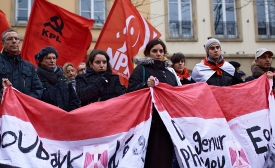arab spring
Deal or no deal in the Iranian nuclear talks, Tehran is already behaving like it's made a killing. Sure, U.S. and international sanctions inflicted staggering damage on Iran's economy, convincing the longtime American foe to join talks aimed at limiting its nuclear program.
After months of negotiations and reviews, Turkey and the U.S. have signed a train-and-equip agreement aimed at bolstering moderate Syrian opposition fighters. This agreement is likely to have diplomatic outcomes between the two NATO allies and provide answers to many questions currently in the air, however, if we analyze the situation objectively, the “train-equip agreement” is going to make very little change in the civil war situation – if any.
Three fundamental and one extraneous force are currently colliding in our region. Each of these forces has its own agenda and because none of them is truly dominant, the end result is a clash rather than competition.
The nation now most prone to such diplomatic pirouettes is the United States, still the world’s greatest power. Its strength has ever been defined, in important part, as idealism, “soft” power: belief in pluralism in politics, in free speech and a free press. These institutions are held to self-evidently good for a society: and the United States, with the European allies, has long preferred and rewarded those states which promise to follow that path.
Activists in other countries who led their own Arab Spring movements said they were “jealous” of Tunisians Sunday. “We voted in Egypt but we lost our Arab Spring,” said Khaled Mansour, a student in Alexandria who took part in the 2011 protests.

Prior to the 2011 uprisings in the Middle East and North Africa, economic, political, and internal security policies were considered to be fundamental features of authoritarian regime maintenance.
Egypt's generals appear to have an awfully short memory. A year after they massacred supporters of the Muslim Brotherhood in the streets of Cairo, they have some advice for American authorities on how to handle the spiraling unrest in Ferguson, Mo.
White House says aid will help defend Syrian people, stabilize areas under opposition control, facilitate the provision of essential services, counter terrorist threats, and promote conditions for a negotiated settlement.







